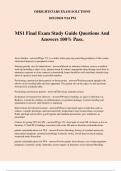©BRIGHTSTARS EXAM SOLUTIONS
10/21/2024 9:24 PM
MS1 Final Exam Study Guide Questions And
Answers 100% Pass.
Arcus Senilus - answer✔Page 371; is a milky white gray ring encircling periphery of the cornea;
cholesterol deposits in peripheral cornea
Nursing priority care for tuberculosis - answer✔placed on airborne isolation, receive a medical
work up including a chest x-ray, sputum smear & culture; appropriate drug therapy;teach how to
minimize exposure to close contacts in household; home should be well ventilated; should sleep
alone & spend as much time as possible outdoor
Positioning a patient for thoracentesis or thoracotomy - answer✔Position patient upright with
elbows on an overbed table and feet supported. The patient sits on the edge of a bed and leans
forward over a bedside table.
Positioning unconscious patient - answer✔Side-lying; maintain airway
Evaluation of treatment for infection - answer✔Wound is healing; no signs of infection e.g.
Redness, warmth & swelling; no inflammation, no purulent drainage; wound is healing and
granulation is present; skin integrity is impairing
Interventions for infected wounds - answer✔Observe and report signs of infection such as
redness, warmth, discharge, and increased body temperature; keep wound clean, encourage
fluids and high calorie diets; good hygiene and standard precautions; give antibiotics as
prescribed
Criteria for giving TPA for MI; - answer✔Page 751; chest pain of acute MI six hours or less in
duration; 12 lead ECG findings consistent with acute MI and no absolute contraindications
patient contraindications for TPA - answer✔Active bleeding; history of cerebral aneurysm;
intracranial neoplasm; cerebral hemorrhage; Ischemic stroke; closed head or facial trauma;
suspected aortic dissection
patient contraindications for TPA - answer✔Active peptic ulcer disease; use of anticoagulants;
pregnancy; ischemic stroke, dementia; recent surgery or puncture; recent internal bleeding;
, ©BRIGHTSTARS EXAM SOLUTIONS
10/21/2024 9:24 PM
terminal cancer, severe liver or kidney disease; uncontrolled hypertension; Traumatic or
prolonged CPR
Risks for tinnitus - answer✔Medications such as aspirin, and lasix given too fast I V; Ménière's
disease
Risks for AML - answer✔Children ages 0-7; increased risk in advancing age over 55
Priority intervention for AML - answer✔Infection control
Assessment of anemia - answer✔Pallor, jaundice, pruritus, retinal hemorrhage, blurred vision,
glossitis, smooth tongue, tachycardia, systolic murmurs, claudication, angina, heart failure, MI,
tachypnea, Orthopena, headache, vertigo, depression, anorexia, dysphagia
Administration of eardrops - answer✔Place bottle of drops in bowl of warm water for five
minutes; tilt head in the opposite direction of the affected ear and place in drops, do not touch the
ear with the dropper; have patient keep the head tilted to the side for 2 to 3 minutes; do not place
a cotton ball in the year
Evaluation for post op pneumonia - answer✔cough, fever, shaking chills, dyspnea, tachypnea,
and pleuritic chest pain;, Sputum may appear green, yellow, or rust colored; diaphoresis,
anorexia, fatigue, myalgias, headache, & abdominal pain; rhonchi & crackles
prevention of post op pneumonia - answer✔Encouragement to breathe deeply at frequent
intervals; early mobilization, the use of incentive spirometer and twice daily oral hygiene with
chlorhexidine swabs; cough turn and deep breathe; IS 10 times every hour while awake
Management of odynophagia during head or neck radiation - answer✔Page 268; May require the
use of analgesics before meals
Management of acute allergic reaction - answer✔Page 214-215; management includes the use of
epinephrine, antihistamines, & corticosteroids
Prep for cardiac cath - answer✔Check for sensitivity to contrast media; withhold food and fluids
for 6 to 12 hours prior; give sedative and other drugs; patient may be instructed to cough or deep
breathe when dye is injected; patient is monitored by ECG throughout procedure
Management of thrombocytopenia - answer✔Notify HCP of any signs of bleeding; ask about
activity restriction; don't blow nose forcefully; prevent constipation; shave with electric razor;
avoid meds that prolong bleeding; soft Bristle toothbrush; females keep track of periods; notify
HCP before any invasive procedure




